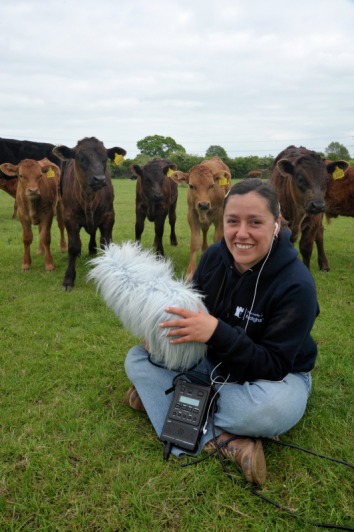Behaviour and Ecology
@ School of Life Sciences,
University of Nottingham
| Home | People | Research | Teaching | Publications | Opportunities | Links |
 Monica Padilla de la Torre (PhD 2013)
Monica Padilla de la Torre (PhD 2013)
Supervisors: Alan McElligott & Tom Reader
Monica finished her PhD in 2013 and after a brief postdoctoral project looking at purring in cats, she returned to Mexico to pursue a career in science! Here's how she described her project:Research Interests
Vocal communication in cattle
My PhD research is on animal behaviour, specifically in
vocal communication. It is well known that in most ungulates, the recognition
process between mother and their offspring mainly involves olfaction and
audition. However, olfaction only permits identification at short range, while
acoustic signals are efficient over both short and long distances, and therefore
vocal communication appears to be a key factor for mother-offspring
recognition.
It has been determined that the vocal identification process
is unidirectional in some “hiding” species of deer (where young animals remain
hidden while their mothers forage). However, in “follower” species such as
domestic sheep (Ovis aries), mother and offspring are capable of recognizing
each other using contact calls. By studying different species, we can assess
the extent to which this distinction between hider and follower species is
generalised, and determine how different environments and survival strategies
can affect the evolution of vocal communication systems.
My project focuses on mother-offspring communication in cattle (Bos taurus). In order to determine which acoustic patterns in vocalisations are important for individuality in contact calls of adult females and calves, I will carry out field recordings and acoustical analysis. Playback experiments will be used to test calf recognition of adult female contact calls, and test adult female recognition of calf contact calls, allowing me to determine what parts of the vocalisations are used for recognition.
My project is funded by CONACYT.
Latin American women in England